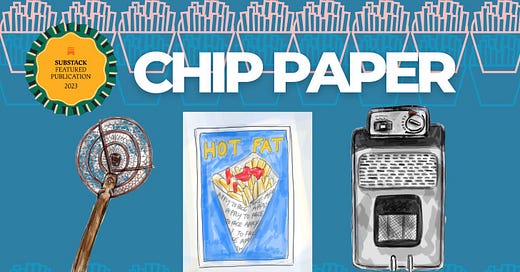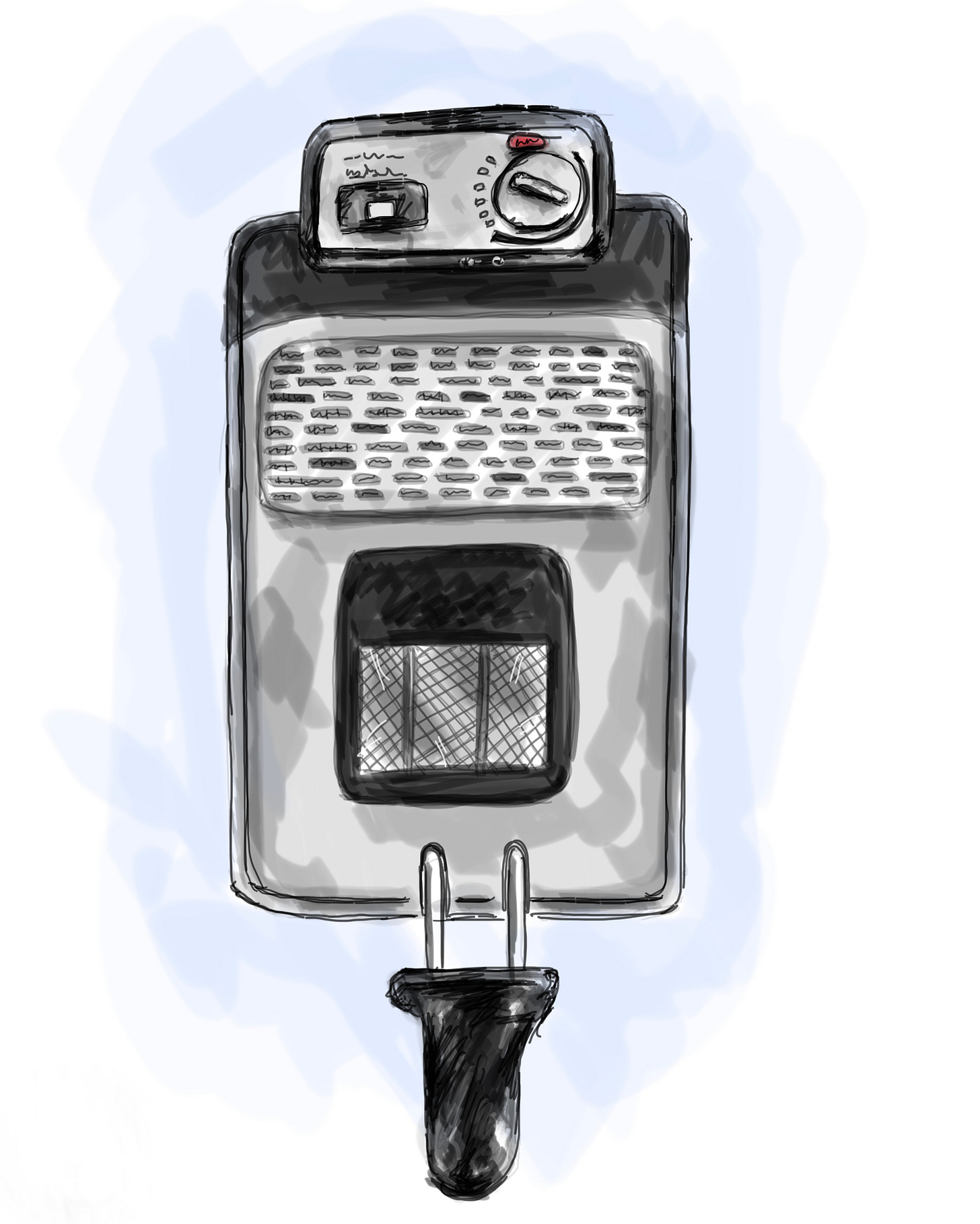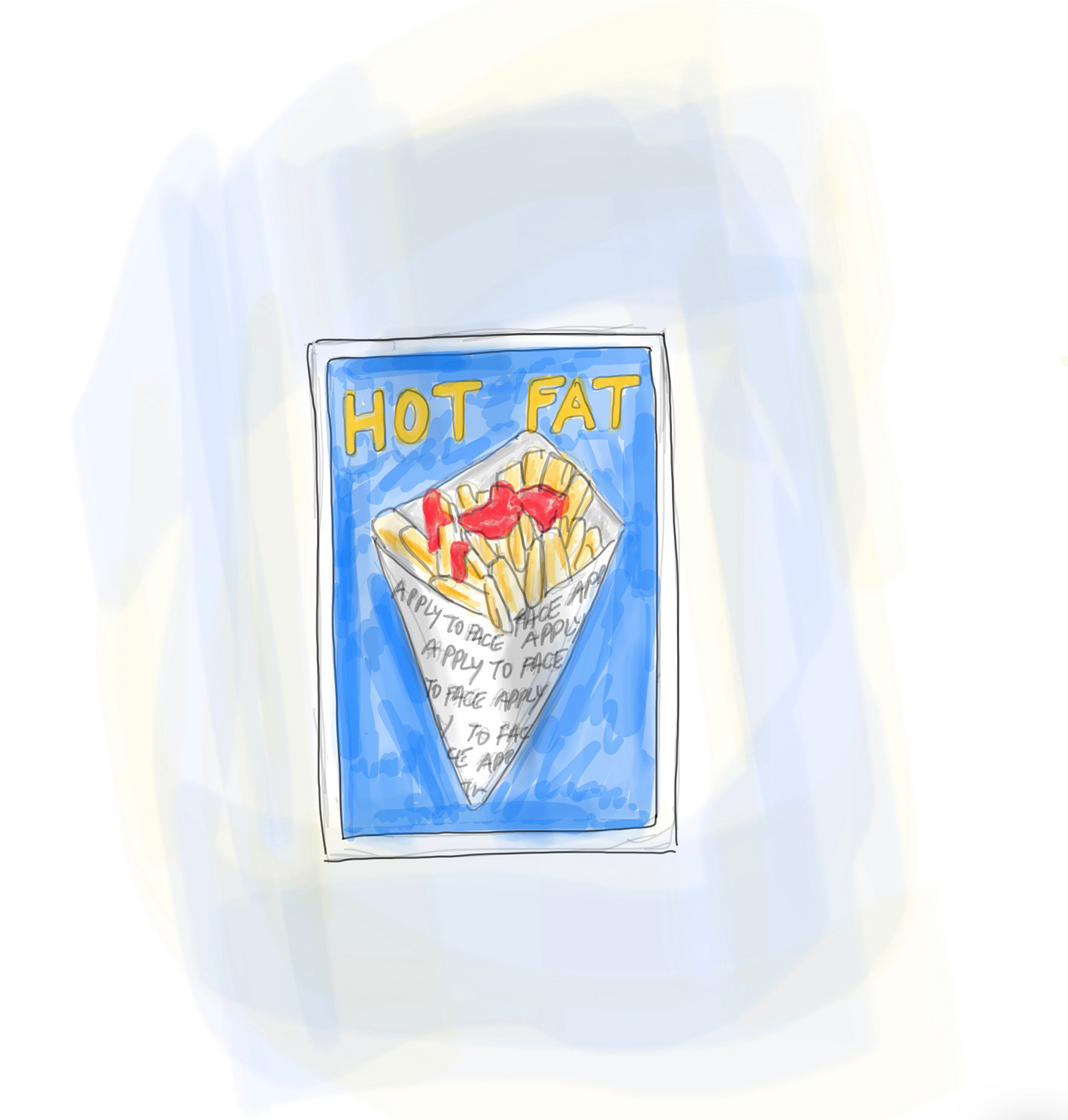If Fat = Flavour, Why Does Hot Fat = Fear?
Fear is the ultimate hurdle, and we've challenged pre-conceived fear for over a decade... so imagine what happens when you go beyond it by going through it?
Why are you so scared of frying?
We’ve written a book on the subject of deep-frying. It’s not an ‘appliance’ book, it’s a book dedicated to a particularly terrific cookery technique. It’s delicious and a treat to read, cook and eat from, if we do say so ourselves. However, we can definitively divulge that the biggest barrier we’ve encountered to our book is fear. People will mindlessly wield blunt knives in kitchens (itself a reckless, risk-riddled move) and reach their hand into a piping hot oven at the risk of their skin being scorched but heating oil to fry food within petrifies them. Outright - perhaps outdated? - fear, which is more often than not a hangover from historic, often misjudged advice. So why, if fat = flavour does hot fat = fear?
We pitched this feature to a publication who graciously passed on commissioning this article idea but we couldn’t let it go. Something about fear resided within us, something about the connection between the subject and title of our debut book swam within the lake of fear, and we’ve noticed it because we’ve fought back against fear in several other aspects of our lives. So, we owed it to ourselves and to you to put this out here, free to read, because it’s something we’ve held on to for almost a year now. People place this barrier to our witty words and brilliant recipes in Hot Fat because the subject scares and challenges them. Imagine if they just allowed themselves not to be dictated by fear? Imagine the possibility.
It’s a funny ‘ol beast, is fear. For Patrick, in particular, he’s lived a life almost solely navigated via and dictated by fear. As a life-long stammerer, terrorised by fear daily for 21 years, it wasn’t until he faced it head-on that the control he had given over to it was won back, bit-by-bit tirelessly working away at building his confidence up and taking power away from fear across the last decade. Not overnight, not blindly, not alone, rather with tools, guidance and practice. We like to see our book as an encouraging, supportive, helping hand in a similar fashion.
You see, once you face fear - any fear, really - it’s actually not that scary any more. Granted, a brazenly easy sentiment to express and a far harder task to undertake. But it’s like picking up the phone to make that difficult call, being in the same room as an animal that scares you or pushing yourself physically to literal new heights. Once you tackle it, fear seems to subside, slowly at first but then it gathers momentum like two trolleys on a rollercoaster passing one another –– one whooshing upwards (confidence) the other nose-diving downwards (fear). But the clincher is: you need to go THROUGH fear to get past it. We personally haven’t yet found another way.
Marketing as a Menace
Food is layered in fear, like a Caesar salad gets anointed in its creamy dressing which looks angelic but hides within its secret astringent weapons of mustard, anchovy and lemon. You can’t discuss the dark art of deep-frying - as we lovingly dub it - and how it has been maligned without mentioning marketing. Food has become a weapon and fear used as a means to wield power and control. We’ve all lived through the endless noise of fad diets, cleanses, clean eating and #fitfam, and oil has suffered from marketing slant and being branded a public health enemy for decades. Healthy fats are wonderful, they say. “Chug all the avocado oil you can get, smear coconut oil not only on your toast but also on your face, and make sure you have three portions of oily, fatty fish a day” –– but avoid frying a slice of plantain to a warm, brittle crisp or coating and dunking some spicily-floured free-range chicken in hot fat at all costs. Those are bad and things to be wary (read: scared) of. Barbecue is a similar maligned cookery process which instills fear in people, but that’s a subject for another day.
We jest in the hypothetical example above, but also this really is the kind of slant regularly being slung, and it’s seeped into the collective consciousness. Ingredients and cooking methods have been polarised, deemed good and bad (mostly by self-appointed experts with personal agendas rather than research or science-backed studies) and indeed weaponised. Of course, balance is key and everything in harmonious moderation and equilibrium, but demonising entire food groups, ingredients and techniques is not the way to achieve balance in food and nutrition, if you ask us. To us that sounds more like disordered, disorientated eating –– but, again, we’re not trained dieticians or medical professionals so don’t take our word for it, just like we don’t take nutrition advice from non-nutritionists.
Not to be condescending but instead of avoiding the entire process, would you not just educate yourself on how to fry safely? Take three pieces of advice from us to arm yourself with necessary knowledge before deep-frying: one, never leave hot oil unattended, which is very basic, obvious guidance but bears repeating; two, always monitor the oil temperature (overheating oil to excessive temperatures creeps into the danger zone); and, three, avoid where possible putting watery/wet things into hot oil which can make the atmosphere volatile (particularly par-boiled potatoes for chips — pat them dry = better control and lesser issues!). Sure, there’s much more nuanced guidance we could offer for different recipes using hot fat, but, really, that should suffice in equipping you with confidence to begin. Oh and four, buy our book ;)
Fear, Once Removed
Like with eating animal products, there’s a certain distance that’s digestible when it’s not your very hand that’s part of the process. There’s no fear when you’re savouring the sweet fruit of the fryer: picking up your chippy dinner of battered fish and chips, crunchily making your way through spring rolls or prawn toast and lavishing in the luxurious ooze of croquettes, shatter of samosa or chew of sugary churros in restaurants. It’s just when it’s in our own homes we get a bit squeamish or nervous. Once we take no hand in how what we’re putting into our mouths has gotten there, we’re cool, content customers.
Something we write about in the book is texture, and we explain that pretty much most chefs will tell you “texture is everything”, while arguing that no dish is complete without textural difference. You’d be surprised how often deep-frying (in varied forms) delivers that difference to your plate when eating out. It’s fast, efficient, and frying has been perfected over the recent century as a key step in a kitchen’s arsenal in crafting dishes that have optimum mouthfeel. Flavour is imperative, but a bowl of different-flavoured wet elements won’t hold a candle to a diverse dish of textures, temperatures and techniques.
A word on chip pans. Collectively, we’ve pretty much resigned open-pot chip pans to the past - probably for the best - in favour of enclosed, structured, dedicated frying appliances with temperature dials and sturdy lids. These make you, the user and home cook, feel safer and more in control of the process. However, instead of simply evolving with the times and embracing new equipment there’s been a bubbling anti-fryer mass movement, which we would wager comes from a place of scaremongering and fear. Yet frying, in various rudimentary forms, has been with us for several millennia. As far back as Classical antiquity there’s evidence pointing to the combination of heat and oil to cook and crisp things, whereas it took until the late Middle Ages to properly bed in around Europe. So frying is not a ‘new’ phenomenon, but why are we still not comfortable with it?
You Are What You Eat
Why is it not called deep-oil frying? Or submerged frying? Or hot oil cooking? One has to wonder whether the term deep FAT fryer has had anything to do with the bias against frying. We’re petrified of the word ‘fat’, or - rather - being associated in the same circles as fat. It’s a negative connotation yet ‘fat’ in its most general term (and granted not all fats are made equal) is imperative to human nutrition. This has likely not been helped by the “You Are What You Eat” rhetoric sloshed right across the early 2000’s by pseudo-scientists and self-proclaimed doctors, some of which later became gossip column fodder and reality tv staples (which speaks volumes) but that quote is actually a derivation of Jean Anthelme Brillat-Savarin’s 1825 formative text Physiologie du Goût (‘Physiology of Taste’) where he theorised the idea of “Dis-moi ce que tu manges, je te dirai ce que tu'es”, or in English “tell me what you eat and I’ll tell you what you are”.
The nuance and poetic licence employed two centuries ago by Brillat-Savarin was ultimately lost by the new Millennium, weaponised in a feat of scaremongering so-as-to-say: If you eat unworthy, “bad” foods like saturated fats, sugar and preservatives, you ARE those things, and nothing else. This seeped into the collective consciousness and was reinforced so many times it cemented. It sold big time, and then kind-of went away. Yet, we didn’t even notice the same weaponising of ingredients and foods occurred again a decade later with the clean eating brigade, who, arguably, went even a step further. This cohort began claiming not only to have felt better from eating specific foods, or in specific ways, (“glowing skin”, “boundless energy”, “better sleep”) but to have “cured” certain conditions entirely, and - damagingly - simplifying modern medicine by streamlining it into a mostly-vegan and raw diet of energy balls, smoothies and buddha bowls. We all fell for it, again.
Too Niche
It’s both ironic and not ironic at all that for our debut cookbook we tackled a difficult and slightly maligned subject. Fear constructs barriers and sadly we knew before it launched our debut book would never be a bestseller.
We resigned ourselves to it early on for three reasons: the subject (frying), the name (Hot Fat) and our name (GastroGays). A triple threat to the status quo, where effectively most of the ten best-selling cookery books at any one time are connected to some form of diet, weight loss plan or vaguely-veiled as “healthy”, not to mention most of the authors of such are straight, white and english-speaking. Had we gone down the Air-fryer route we would have sold a hundred times (or more) the copies we did, but it wouldn’t be true to us because it would have been a cop-out and would have curtsied and conformed to the comfortable ‘norm’ and we’ve never taken the direct path. [Our publisher Kristin recently shared the rousing, call-to-arms speech “To Niche!” she presented at Food on the Edge in 2022 over on her Substack Well Read & Well Fed, which is well-worth a read]
We’ve always felt like we ourselves are a bit of a difficult subject and thus we’ve always been disruptive and unafraid to challenge stereotype or prejudice, even in the most subtle ways that you don’t see or feel but we viscerally do. We’ve spent a decade in our industry regularly having to defend ourselves, our place, our point of difference or what we do in the face of ignorance or fear, simply (but powerfully) because of the title we work under.
What’s in a name?
There’s definitely a tinge of fear surrounding our brand name, GastroGays (or as most people erroneously write “The Gastro Gays”). It’s uncomfortable and challenging for people, and please don’t pretend it’s not. We know it, and we’re telling you it’s okay that you know it, too. Let’s not solely acknowledge, let’s name the elephant in the room. The moment anyone hears our brand name for the first time there’s an instant mental reaction, we witness it behind the eyes. There’s always a certain preconception, prejudice or even just a trickle (sometimes a flood) of homophobia.
Unfortunately we live in a straight-prioritised world, so even the most open-minded person will immediately have a preconception about who we are and what we do from hearing our brand name. Mostly it’s harmless things like assuming we only cover travel in the form of pride parades and clothing-optional beaches, or that our food content is just stereotypical “gay” food like rainbow cakes and sprinkles on everything. Some may assume our national newspaper restaurant reviews to just be drag brunches and cocktail bars. Sometimes people fail to even allow themselves to understand what we do or what we produce because they veil it as spreading a “gay agenda” –– whatever that is. We must have missed the pink, sparkly memo on unicorn-stickered paper that we all have to adhere to in an unspoken way.
Sometimes we have to half-jokingly reassure people “you won’t catch it off us”, like covid or a common cold –– we say “half” because there’s a trickle of truth in it. We almost do need to reassure people, and challenge their unchallenged fears, which is a depressing but real feeling, and you need to know that we have to do that, often. In interviews or private conversations when we’ve been asked on a deeper level about the name we’ve never shied away from the fact we feel GastroGays has been both a help (a fabulous, attention-grabbing moniker) and a hindrance (a noticeable, obvious and easy target). Our operating name is a point of difference, but therefore it sticks out for good and for bad. Our name presents distaste and dislike, much in the way that frying does. But when people are given our content or words without knowing where they came from, like a bag of chips from the takeaway, it’s digestible and delighted in.
We’ve always flirted with fear, and a lot of what we do serves to reassure and reinforce or challenge and question. We operate from an innately maligned position, as does deep-fat frying, but we’re not afraid to challenge others and argue our corner –– which we will continue to do for frying and Hot Fat. You won’t catch “gay” off us, and you won’t gain a stone from eating one delicious thing or another from the deep-fryer every once in a while. Of course, it goes without saying, moderation is paramount and common sense should always prevail. You’re probably micro-dosing fried food already, anyway, without even noticing if you’re eating out regularly in restaurants or fond of the odd takeaway.
So, if we have anything to share, from what we’ve learned over 30 years about fear -whether from battling stammering, social anxiety and exclusion to taking on difficult, maligned topics in food writing, questioning the industry status quo or shining a light on subtle homophobia by never shying away from ‘gay’ and challenging the preconceptions around it – it’s this: you don’t get past fear without going through it. You don’t get the freedom that lies beyond conquering fear without challenging it first. Fear festers unless it’s brought into the light of day, and fear can be the foe of flavour –– if you allow it. But facing fear requires bravery.
Being brave to teach yourself how to face your fear of frying can result in unlocking delicious nirvana. Now, let’s look at where else you can challenge fear in your life…







